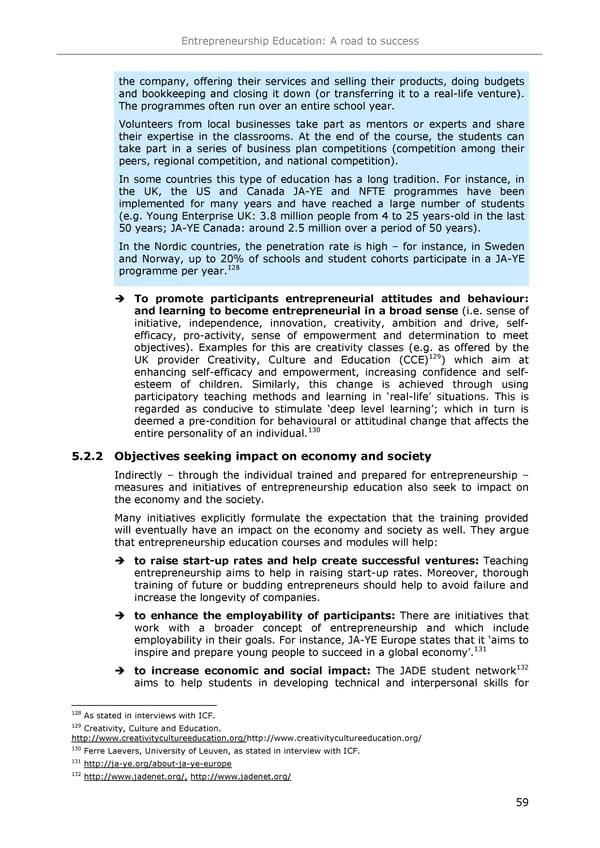Entrepreneurship Education: A road to success the company, offering their services and selling their products, doing budgets and bookkeeping and closing it down (or transferring it to a real-life venture). The programmes often run over an entire school year. Volunteers from local businesses take part as mentors or experts and share their expertise in the classrooms. At the end of the course, the students can take part in a series of business plan competitions (competition among their peers, regional competition, and national competition). In some countries this type of education has a long tradition. For instance, in the UK, the US and Canada JA-YE and NFTE programmes have been implemented for many years and have reached a large number of students (e.g. Young Enterprise UK: 3.8 million people from 4 to 25 years-old in the last 50 years; JA-YE Canada: around 2.5 million over a period of 50 years). In the Nordic countries, the penetration rate is high 3 for instance, in Sweden and Norway, up to 20% of schools and student cohorts participate in a JA-YE 128 programme per year. To promote participants entrepreneurial attitudes and behaviour: and learning to become entrepreneurial in a broad sense (i.e. sense of initiative, independence, innovation, creativity, ambition and drive, self- efficacy, pro-activity, sense of empowerment and determination to meet objectives). Examples for this are creativity classes (e.g. as offered by the 129 UK provider Creativity, Culture and Education (CCE) ) which aim at enhancing self-efficacy and empowerment, increasing confidence and self- esteem of children. Similarly, this change is achieved through using participatory teaching methods and learning in 8real-life9 situations. This is regarded as conducive to stimulate 8deep level learning9; which in turn is deemed a pre-condition for behavioural or attitudinal change that affects the 130 entire personality of an individual. 5.2.2 Objectives seeking impact on economy and society Indirectly 3 through the individual trained and prepared for entrepreneurship 3 measures and initiatives of entrepreneurship education also seek to impact on the economy and the society. Many initiatives explicitly formulate the expectation that the training provided will eventually have an impact on the economy and society as well. They argue that entrepreneurship education courses and modules will help: to raise start-up rates and help create successful ventures: Teaching entrepreneurship aims to help in raising start-up rates. Moreover, thorough training of future or budding entrepreneurs should help to avoid failure and increase the longevity of companies. to enhance the employability of participants: There are initiatives that work with a broader concept of entrepreneurship and which include employability in their goals. For instance, JA-YE Europe states that it 8aims to 131 inspire and prepare young people to succeed in a global economy9. to increase economic and social impact: The JADE student network132 aims to help students in developing technical and interpersonal skills for 128 As stated in interviews with ICF. 129 Creativity, Culture and Education. http://www.creativitycultureeducation.org/http://www.creativitycultureeducation.org/ 130 Ferre Laevers, University of Leuven, as stated in interview with ICF. 131 http://ja-ye.org/about-ja-ye-europe 132 http://www.jadenet.org/, http://www.jadenet.org/ 59
 Entrepreneurship Education Page 62 Page 64
Entrepreneurship Education Page 62 Page 64